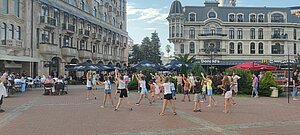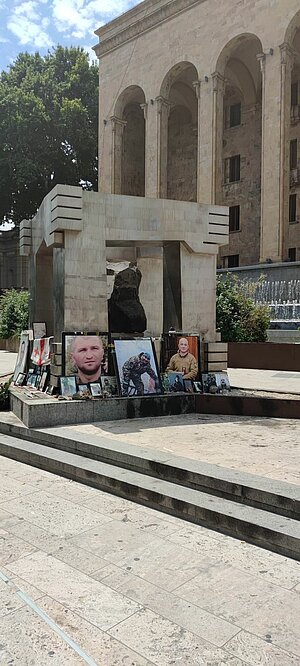
Motivational dance for refugee children from Ukraine. Europe Square, Batumi, August 2022. (Photo by Nino Aivazishvili-Gehne)
On the tenth of March, I happened to meet a refugee family from Ukraine in Osnabrück who were looking for a reception office. The woman in her 30s asked me first in English and was very happy to discover that I knew Russian. I then accompanied the family to the office. The woman gratefully and emotionally said the following to me: “The way you [Georgians] understand us, nobody understands us like this. You also experienced the war with Russia. We are holding out. You are a small country. You couldn’t hold out.” (From my field diary, 10 March 2022, Osnabrück)
This example from my ethnographic fieldwork from March 2022 shows how Georgians and Ukrainians are united by the suffering of war. Both come from peripheral regions of the former Soviet Union under attack by Russia, which creates a special bond that extends all the way to the German exile.
However, such links are rarely mentioned in countless political and social debates in Germany and Austria. Journalists on talk shows, scholars at conferences, and people in cafés talk about the war in Ukraine as a war on European soil and wonder how it could have come to this. “Another war with us in Europe” is the disappointed summary of the current political processes that some interlocutors give – a notion that betrays a lot of the self-centredness of the European debate on the Russian war in Ukraine.
In April 2022, I attended a historical conference in Salzburg. As expected, we could not avoid the Russia-Ukraine war as a topic of discussion there either. There was a lot of conversation about the past and future scenarios. Among other things, symbols and their use in warfare were a topic of discussion. As one researcher claimed, the Russian use of the letter Z as a symbol of the war echoed the aims of the Second World War, representing the fight against Nazis(de-nazification)and constituting a synonym for victory (za pobedu) and for Stalin (za Stalina) “across the former Soviet Union.”
This statement made we wonder how, firstly, one could see this connection so clearly and, secondly, how one could talk about the entire former Soviet Union as a unified space. Researchers dealing with the former USSR know very well that there was never “one space,” not even during Soviet times. Moscow acted differently in centres and peripheries and even within regions. That the ideological “language of the Soviets” had to be spoken in every Soviet republic does not mean that everyone spoke only that language. This was and is also the case with symbolism. Of course, I cannot speak for the whole post-Soviet space nor for the whole of Georgia, but from what I have seen and experienced as a citizen of this country and also while doing research there, I can say that the citizens of Georgia do not need to dig so deep into the past to classify “Russian tanks”, with or without the letter Z written on them.
Russian Wars of the Recent Past
There have been several wars on Georgian soil since the country’s independence, starting with bloody clashes with ethnic Ossetians in 1991-1992, which resulted in some 1,000 deaths and caused the displacement of around 60,000 people. In the 1992-1993 Georgian-Abkhazian War, an estimated 10,000 people died and about 250,000 people, predominantly ethnic Georgians, were expelled from the Abkhazian region. To this day, the vast majority of these people cannot return to their homes (over 200,000 people).
In August 2008, there were again armed conflicts between Georgians and Ossetians, the latter supported by Russian troops. The tragedy known as the Russian-Georgian War lasted only five days but resulted in many civilian deaths. An estimated 26,000 people, mostly ethnic Georgians, fled their villages in the Tskhinvali Region in 2008.
Why has Europe been so blind to the events beyond its own borders? This blindness is especially startling considering that Russian aggression affects much larger geographical areas than “just” Ukraine now or Georgia in the past. There were two Russian wars in Chechnya, and there is the ongoing Russian involvement in the war in Syria, a war that has triggered one of the largest refugee movements of the twenty-first century.
Why do European countries pay so little attention to these experiences? To people from the attacked former “peripheries” of the Soviet Union, the connection to current events in Ukraine is blatantly obvious. Is it because the knowledge of these people is not seen as valuable and useful? Not only is the 2008 war in Georgia somehow “forgotten”, the war in Ukraine itself has started already in 2014 and since then has also been ignored until February of this year.
Why not listen more to local voices, for instances to the inhabitants of occupied villages in Georgia who experienced the war and still have to live with the consequences for years afterwards? 20 percent of the Georgian territory is occupied by Russian troops. There are reports of constant changes in the borderline and of Georgian citizens being detainedwith the accusation of having crossed the border illegally.Due to borderization processes, the residents are not only separated from each other, but also from their farms, pasturelands, irrigation sources or village cemeteries. Such knowledge would be useful to see the future prospects for the European Union more clearly. Instead, in current “expert discussions”, there is hardly any debate about the present situation in the non-EU countries surrounding Russia. As if these were irrelevant. And so, the citizens in these countries feel left to “God and themselves”,as I hear from many acquaintances and friends in Georgia, knowing that their fate is “not worth it”. Disappointment and pessimism feed fears and stir up aggression.
Fears of the Future
Maybe surprisingly for many non-experts, up to 40,000 Russians have chosen Georgia as a place of refuge since March 2022. During my short stay in Tbilisi in July/August 2022, I heard from several friends about “many more” Russians in the country. One can assume that they count both refugees and tourists together. According to media reports, the number of visitors from Russia to Georgia increased rapidly between January and June 2022.For June, the figure was 247,000 people.The atmosphere is gloomy. The everyday discourse is dominated by fear. “There are too many of them” and “you don’t know what’s coming,” as some of interlocutorsexpress it. Georgian society is polarised. The daily demonstrations in Tbilisi supporting Ukraine and protesting the Russian invasion shows this very well.
Emotions run high. Fears cloud the vision of the future. Some people are afraid of losing their jobs, as Georgia is a popular destination for Russian-speaking tourists, and native speakers of Russian are more likely to be employed in the hotel and catering industry, as an interlocutor from the Black Sea region told me. Others see the refugees as “Trojan horses” because of Putin’s “passport policy”: both in 2008 in the Tskhinvali Region (occupied by Russian troops) and 2014 in Crimea, the Russian government used the distribution of its own passports as a strategy to allegedly protect its own “citizens in danger”. Conjectures about similar strategies are now being discussed in relation to Adjara, an autonomous region in the southwest of the country. According to my interlocutors, the Russians are buying up land on a large scale, especially in the areas by the sea. What once happened in Abkhazia and Crimea could also endanger Adjara and its capital Batumi, Georgia’s second largest city. These are the fears of the inhabitants.
The Suffering of Others
How long will “Europe” – this space of peace, democracy, and freedom – leave the suffering of non-Europeans, such as Georgians, unseen? Non-Europeans who place their hopes on a European future of their countries: when the EU rejected Georgia’s application for candidate status in June 2022, the country witnessed the largest demonstration in recent years in Tbilisi under the slogan “Home, to Europe!” and the rise of a new pro-European activist’s movement striving for Georgia’s rapprochement with Europe and against oligarchic structures. Political actions show that “Europe” feels empowered to decide what is right and what is wrong with regard to the current Russian-Ukrainian War.Butwhere can this lead if such essential experiences and desires of “others” are not respected?

Monument dedicated to the victims of the protests of 9 April 1989.
Additionally decorated with photos of fallen soldiers in the Ukraine-Russia war, July 2022
(Photo by Nino Aivazishvili-Gehne)
Nino Aivazishvili Gehne holds a PhD in social anthropology and is a research associate at RECET in Vienna. In her current project “The search for the ‘good life’ in Germany (Osnabrück)” she investigates social perceptions of migrants from the former USSR in Germany.
